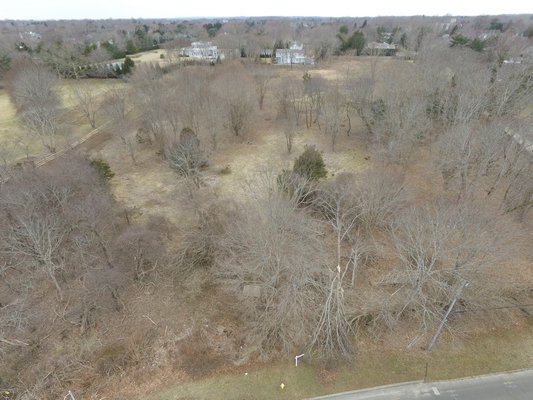
Southampton Town Board members on Tuesday approved the purchase of a 2.9-acre lot in Southampton Village for $10 million using Community Preservation Fund money, with plans to preserve it as open space.
The property, located at 111 Pond Lane, just south of the historic Pyrrhus Concer house lot, is owned by FHW Limited Partnership, which expressed interest in selling the property to the town.
Southampton Village Mayor Michael Irving said on Tuesday morning that he plans to leave the property as open space.
“I think that the open space is huge, because we have so little in the village,” he said. “There are some old growth trees in there, and it’s a pretty nice piece of property once it gets cleaned up a bit. There’s a lot of overgrowth of various non-indigenous plants and stuff in there, and we plan to clean all that out.”
Being next door to the Pyrrhus Concer property, which was purchased using CPF money as well, Mr. Irving said, the open space will make the area more contiguous. The current plan for the Concer property is to restore the historic house, which had been demolished, as a public resource, though no completion date is currently set.
He also said that given the property’s proximity to Lake Agawam, village officials could choose to install a rain garden along the front of the property to catch rain runoff before going into the lake.
Like Mr. Irving, Southampton Village Board member Kimberly Allan emphasized that there are not many open parcels of land left in the village.
“We were fortunate to have a willing seller and a Town Board that appreciated the historic significance of the park, its meaning to the community and impact on Lake Agawam,” Ms. Allan said in a text on Monday. “The preservation of these lots will help protect that vista, the old growth of trees and Lake Agawam’s water quality—so residents and visitors alike can enjoy the park festivities and the open vista for years to come.”
Mr. Irving said with the help of Ms. Allan and Village Planning Commission member Joseph McLoughlin, a list of properties for CPF consideration was sent to the town, and the 111 Pond Lane property was identified as one of the critical ones because of its proximity to Lake Agawam.
“We finally got it after it was designated a priority for decades,” Ms. Allan said.
“I think it’s a big asset to the village, and we’re finally getting some usage out of the open space funds that we’ve contributed so religiously to,” Mr. Irving added.
The town is expected to spend $3.5 million of CPF money per acre for the lot. The money is not coming from the 20-percent of CPF designated for improving water quality, even though Mr. Irving suggested the possibility of installing a rain garden for that purpose.
In comparison, on March 12, the town spent $2 million of CPF money to purchase an enhanced easement over 20 acres of farmland in Water Mill—or $100,000 per acre—in an effort to assure the land is forever farmed and not sold off for real estate.
Although an agricultural reserve was on the property and served as a protective easement, the town chose to place the enhanced easement over that to make sure 80-percent of the 20 acres is used for food production, where the other 20 percent can be used for structures associated with food production or more farming.
Peconic Land Trust President John v.H. Halsey thanked the board members for their efforts in preserving the land.
“This is the 12th or 13th instance where the town will be buying these enhanced easements,” he said. “Really, what you’re doing, is assuring that this land will be farmed.”